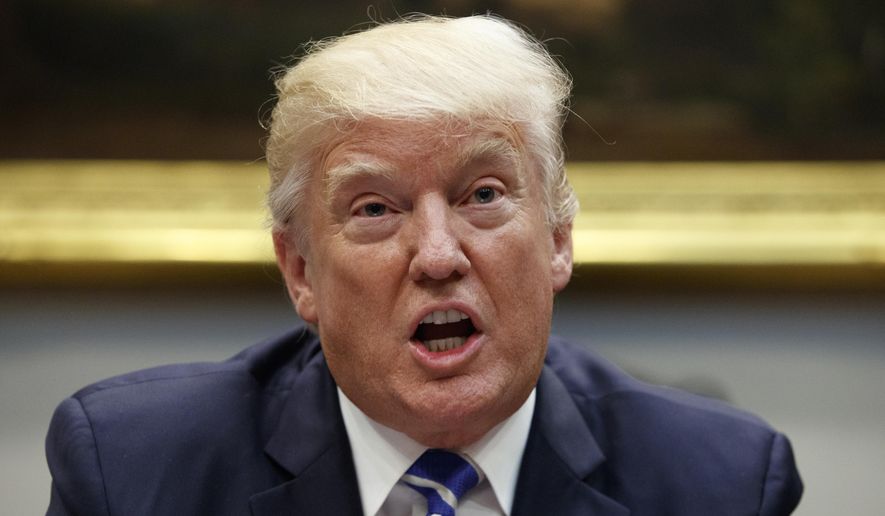President Trump, who vowed as a candidate to scrap a deportation amnesty program for young illegal immigrants, wrestled for months in office over how to treat them with “heart” while rescinding job benefits that he was convinced former President Barack Obama created illegally.
Advisers say Mr. Trump debated his move back and forth into the Labor Day weekend, with only two realistic options: wait for federal courts to likely end the DACA program abruptly, or phase it out gradually by executive action and give Congress more time to devise a solution for the 800,000 young people affected by his move.
Mr. Trump told reporters at the White House that he had “no choice” but to order an end to the program.
“I have a great heart for the folks we are talking about, a great love for them,” Mr. Trump said. “Long term, it’s going to be the right solution. Hopefully now Congress will be able to help them and do it properly.”
Ending the Deferred Action for Childhood Arrivals program was one of Mr. Trump’s campaign pledges — he once said he would end it on “Day One.” But after he took office, Mr. Trump heard from a variety of stakeholders, including faith leaders and major U.S. business groups, who wanted to preserve the program.
“When people come here to learn, work hard and give back to their communities, we should allow them to stay in the United States,” said Jamie Dimon, chairman and CEO of JPMorgan Chase & Co. and chairman of Business Roundtable.
But Mr. Trump ultimately was swayed by arguments that Mr. Obama had exceeded his authority when he created the program, and that phasing out work permits for people in the U.S. illegally was central to his campaign pledge to put “America first.”
“Above all else, we must remember that young Americans have dreams too,” Mr. Trump said. “Being in government means setting priorities. Our first and highest priority in advancing immigration reform must be to improve jobs, wages and security for American workers and their families.”
White House press secretary Sarah Huckabee Sanders said Mr. Trump also agrees with House Speaker Paul D. Ryan’s view that the so-called Dreamers have done nothing wrong.
“It was one of the things that the president wrestled with this decision all throughout the weekend,” she said.
Asked by a TV network reporter if Mr. Trump was being “cold-hearted,” Mrs. Sanders replied, “It’s not cold-hearted for the president to uphold the law.”
“We’re a nation of law and order, and the day that we start to ignore the fact that we are that, then we throw away everything that gives these people a reason to want to come to our country,” she said. “If we stop becoming the country that we were envisioned to be, then we throw away what makes us special, which makes America unique. This president’s not willing to do that. The previous administration was. This one isn’t.”
The White House also introduced a possible element of deal-making in Mr. Trump’s request for Congress to address the issue, saying the administration wants funding for the president’s border wall to be part of any comprehensive immigration reform package.
Mr. Obama, who had mostly refrained from criticizing Mr. Trump since leaving office, jumped back into the fray Tuesday with a lengthy statement that called Mr. Trump’s decision “cruel” and asserted there was no economic justification for it.
Mr. Obama said the young illegal immigrants, known as Dreamers, “are not taking anything away from the rest of us.”
“Kicking them out won’t lower the unemployment rate, or lighten anyone’s taxes, or raise anybody’s wages,” Mr. Obama said.
Mrs. Sanders said Mr. Obama’s action in 2012 created a policy based on legislation that Congress had refused to approve.
“President Obama didn’t just suspend federal law, but implemented a policy Congress had explicitly rejected,” she said.
Mrs. Sanders also told reporters there is a “misconception” that DACA has served mainly to shield illegal immigrants from deportation. She said that characterization of the program is “misleading,” and said the main benefit of DACA is economic.
“DACA grants work authorization to nearly 800,000 individuals who are not legally authorized to work,” she said. “The president was elected partly on his promise to deliver meaningful immigration reform that puts the jobs, wages and security of the American people first.”
Senior administration officials said Mr. Trump was “very involved” in the decision. But in a possible sign of his conflicted views on the matter, the president delegated the announcement about ending the program to Attorney General Jeff Sessions.
Because the legality of DACA is being questioned, Mrs. Sanders said, “it would be the Department of Justice to make a legal recommendation, and that’s what they did.”
• Dave Boyer can be reached at dboyer@washingtontimes.com.




Please read our comment policy before commenting.